THE INSPIRED
|
"One Stone set out to start a revolution… We are in the habit of disruption. We are unafraid. We believe. And together with our partners, we are forging an army of good, for good. We are the ones you have been waiting for." onestone.org
In February the Inspired Learning Project team had the chance to meet with Chad Carlson - Director of Research and Design - at Idaho's One Stone. We left the conversation feeling inspired by a bold vision of learning that is fueled by a shared belief in the power of students.
Some of the highlights of the conversation include:
0 Comments
Student agency challenges not only the structures that define our schools - those of standards, testing, and accountability - but also the mindset of students, teachers, parents, and leaders. Those who are proponents of agency often talk about the power of putting students’ passions at the forefront of learning.
Although this affirmation of passions is well-intentioned, I sometimes hear people discuss student passions in a disparaging way, worrying aloud about whether an 8-year-old, 12-year-old, or 16-year-old could know what they’re passionate about and if the personal passions of children are worthy of the classroom. I worry that if we replace the word “agency” with “passion” that we are undermining the momentum toward student voice and choice. As a dad and an educator, this makes sense to me. I didn’t find my professional passions until leaving college and making my way to the classroom. The word “passion” carries a weight of expectations and purpose that is counter to the spirit of exploration that’s at the heart of student agency. Let’s agree not to use the word passion, not to slow the movement toward agency with an unclear definition of what we value. Instead, let’s replace “passions” with “curiosity”. When we encourage curiosity, we affirm the value of questioning. We remove the pressure of future jobs connected to learning. We promote the freedom to explore with freedom and to engage in a cycle of learning. Pursuing our passions suggests a journey toward a specific destination. Tapping into our curiosities provides an opportunity for reflection, growth, problem-seeking, and learning. Words matter. Let’s embrace a definition of student agency that removes the pressures of passions.
This month the Inspired Learning Project Team interviewed Don Wettrick - innovation educator, author, podcaster, and CEO of StartEdUp. The interview reflected the aspects of Don's work that we most appreciate in that it was thought-provoking, reflective, transparent, and generous. The conversation encouraged inquiry into some the most important questions educators need to grapple with in order to evolve our schools. Included below are ten of the questions that Don answered in the discussion. Listen the interview and a look at the questions below. Then, take a stab at answering them yourself.
By John Clements, Principal of Nipmuc Regional High School With a name like The Inspired Learning Project, it was only a matter of time before we featured Don Wettrick on our blog. As a teacher, author, CEO of StartEdUp, and educational adventurer, Don has become a source of excitement and encouragement for educators who are interested in evolving school to take advantage of modern learning opportunities. Through the StartEdUp podcast he regularly shares moments of inspiration by highlighting the work of students, sharing the ideas of influential educators, and connecting with leaders from the world of business as a way to bridge the gap between schools and the professional world. Beyond that, he has also infused all of his work with an entrepreneurial spirit. His podcast is an example of how great ideas continue to evolve through reflection and dedication. From “Monday Motivation” episodes to features of his students to a series of interviews with thought-leaders, the StartEdUp podcast provides a public and transparent example of the power of iteration. In this resource share, we’re excited to highlight one of StartEdUp’s Young Entrepreneur Spotlight (YES) episodes. This podcast shares the story of Manu (Swish) Goswami, a 19-year-old who turned his experience as a student into an entrepreneurial endeavor. The themes that arise in this spotlight are a reminder of the power and potential of the journey toward modern learning. Check out the podcast to learn about the following:
We want our students to come in and feel really welcome and to feel comfortable in their space. We want them to be running into school, not running out of school. So part of that is also making sure that they have some say in the classroom environment and they have some say and how they can move around in the space… It made sense to also then look at how we can support educators in the classroom to change the furniture and therefore change the learning environment.”
The design of a learning space tells a story about the type of learning that takes place in that room. Teachers recognize the negative impact of a cluttered or drab learning space. They have replaced the isolation of desks in rows with groups or pods that encourage collaboration. They value spaces that encourage curiosity rather than compliance. They ensure that the whiteboard is not the only way to share ideas by providing tools and resources that encourage expression and building and creativity. Fueled by the ideas of their colleagues - whether across the hall or via social media - they are constantly looking for ways to upgrade their learning spaces for students.
The challenge of this work is redesigning on a dime. While we embrace the idea of creating classrooms that embody our beliefs about learning, the reality of school budgets can’t be avoided. Creating an innovative learning space with decades-old furniture can seem daunting. In December’s digital conversation, we had the privilege of speaking with a leader who created a practical, innovative, and inspiring solution to the challenge of redesigning learning spaces. Nicole Bottomely, Principal of Holliston High School (MA), spent some time with our team, sharing the design challenge that she provided to her faculty, practical strategies to empower student voice, the impact of this work on teaching and learning, and the culture of learning that defines her school. Check out the interview and feel free to add your thoughts, ideas, and resources to the comment section.
The work to build schools that inspire requires innovative approaches to overcome the obstacles that stand in the way of change. Through our monthly digital conversations, we highlight educators who are leading the work to reimagine school and the practical, actionable ways they have turned these obstacles into opportunities.
In this month’s digital chat, we took on one of the most formidable barriers to change: time. As a lead-in to our group conversation, we interviewed 2018 Massachusetts Principal of the Year and Principal of Monomoy High School (Harwich, MA) - Bill Burkhead. Principal Burkhead shared his school’s use of “Jawsome Hour”, a practical way to embed opportunities for students to pursue their passions as a part of every school day. In this interview he shares the following:
We hope you enjoy this conversation and that you can join us for our next discussion on December 6 at 8pm EST. Join us as we build a network of learners and leaders who are committed to building schools that inspire!
Each of our digital conversations begins with a short interview with educators who are walking the walk to reimagine school. After the interview, we shut off the recording and engage in ~30 minutes of group conversation which is not recorded. Our hope is to provide a safe space to inspire you to consider new ideas, connect with a network to support your work, and encourage you to be a lead learner for your community. Join us on December 6 at 8pm EST for our next discussion!
By John Clements (A cross-post with NipmucPrincipals.com) Last week I had the chance to give the keynote address at the New England Association of Schools and Colleges (NEASC) annual Showcase of Model Schools. It was exciting to be part of this event which highlighted programming from some of New England’s most innovative schools. The audience was filled with educators who are inspired by the capacity of teachers to create schools that prepare students for the modern world. I focused my comments on “Building Schools We Believe In” and was excited to share the work that Nipmuc has undertaken in building learning experiences that promote student agency, deep inquiry, and real work that matters. When addressing this group of teachers and leaders, I encouraged them to be clear about our job as educators by asking them to share their definition of learning. As you might expect - even for some of the most talented teachers in New England - providing a single, cohesive definition of learning is a challenge. Learning is complex and messy and difficult to describe - even for learning professionals. What’s easier to define is what learning is NOT. With that in mind, I asked the audience to share their answers of what learning isn’t. While it was challenging to build consensus about what learning IS, defining what learning is NOT was simpler. Check out their answers in the image below. What’s exciting to me about these answers is that all of us, whether students or teachers or parents, can agree about what learning isn’t.
We agree that learning is not memorization or regurgitation of ideas. We believe that learning is neither passive nor standardized. We support a definition of learning that moves beyond lecture or skill-and-drill or busy work. If we can agree what learning isn't, can we take the next step and build a shared definition of what learning is? The answer to that question is yes. Let's build that definition together!
3. Questions. Not answers. Our conversations focus on exploring questions together. You don’t need to have expertise… just curiosity.
4. Interviews first. Conversation follows. This year we’ll be hosting short interviews (approximately 10 minutes) with educational leaders who are doing the work to reimagine school before transitioning to full group conversation. The interview segments will be available - podcast-style - for sharing after the convo. 5. Safe space to learn together. The interviews are the only parts of the conversation that are recorded. After the beginning interview, we shut off the recording to allow for open discussions. 6. Change your tomorrow. New ideas shared by a community of professional learners help us to get actionable in shaping the future of our school. Join the discussions to expand your thinking and find ideas that will change your tomorrow. The first Inspired Learning Conversation of the year takes place Thursday, November 8 from 3:30pm - 4:15pm (EST) as we explore reimagining the use of time in school. We’ll kick-off this new season with a short interview with Phil Conrad and Bill Burkhead. Mr. Conrad is Principal of Andover High School who has shared Andover’s reimagination of the school schedule with audiences across New England and the nation. Mr. Burkhead is the 2018 Massachusetts Principal of the Year and Principal of Monomoy High School where their “Jawsome Hour” has injected agency and personalization into the traditional school schedule. Click this link on 11/8 from 3:30pm - 4:15pm to hear the interview and join the conversation. By John Clements, Principal, Nipmuc Regional High School
Where do you go when you want to push your thinking? Do you have a reliable resource that can challenge the way you frame your ideas? If not... welcome to Akimbo. Akimbo is a podcast from Seth Godin - an entrepreneur, author, and thinker whose ideas sprawl across a range of topics from marketing and business to leadership and education.
Godin describes Akimbo as a podcast "about our culture and about how we can change it. About seeing what's happening and choosing to do something." Sound familiar? That mission resonates with an ever-growing audience of educators who spend each day in a similar headspace, reflecting on past practice and creating actionable solutions to build schools that inspire. Any of the Akimbo episodes are worth a listen. They are brief, tightly organized, and thought-provoking. Beyond that, they're told with simplicity, honesty, and closeness that makes the content feel more like a conversation than a lecture. The episode I've featured here makes a case for doing the work - simply, persistently, and purposefully doing the work necessary to make an impact. It's worth a full listen; however for the sake of this blog post, I focused only on the Q &A section at the end of the episode. Each week Godin takes questions from the audience about the previous week's episode. In this Q & A wrap-up, one listener asks the question, "What is school for?" Using the embedded podcast above, feel free to scan ahead to the 20-minute mark of the episode or read the transcript below. Let Akimbo push your thinking with the question, "What is school for? "
Read the excerpt from Akimbo below and see how you would answer the question, "What is school for?".
Q: “How might a large organization like a public school district scale up efforts to make the system fit its students.” A: Yeah, this is a great question and the idea is how do we use the bureaucracy we've got now - the efficient powerful bureaucracy - to make school what it needs to be, which is personalized and individualized education about leadership about making change happen. Well, I think if we think about it a little differently you'll see the problem. Let's say you ran a really efficient division of the army - the division of the army that shaves the heads of all the people on their way into boot camp. That on a good day you can shorn 400 people, no problem. Well, that's super efficient, and I understand how you would organize a squadron of barbers to end up with 400 haircuts done in no time. However, if you're going to take that approach and try to build a chain of beauty parlors and hair salons, you're going to fail. And the reason you're going to fail is not because you're bad at shaving the heads of 20 year olds. The reason you're going to fail is that's not what the public needs or wants from you. And so the wrong answer would be “Here’s how you take this squadron you’ve got that was good at the old job and turn them into people who are good at the new job.” The right answer would be “What's the new job? Let's build something around that.” So the challenge of adjusting the bureaucracy of school is there can be no effortless, easy, top-down solution to this problem. That the problem is going to be solved the different way. It’s going to be solved by parents asking a simple question, “What is school for?” And if we can be clear with each other about “what is school for?”, we will no longer tolerate wasting time and money doing things that school isn't for. And organically - with a lot of dislocation and pain and suffering and discomfort, but yes organically, day-by-day, classroom-by-classroom, student-by-student, the school system will begin to change. But it will only begin to happen when we ask the question, “What is school for?”
Add your answer in the comments below. "What is school for?"
|
Click above to share a practice that promotes student agency, ignites students' passions, or creates a bridge between classrooms & the real world.
Click above to nominate an educator to be celebrated by the Inspired Learning Project.
Archives
November 2020
Categories |


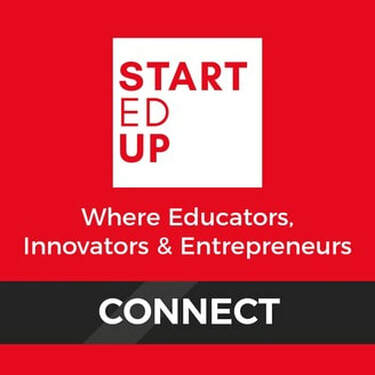
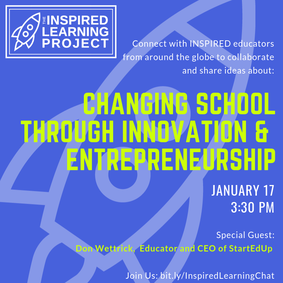
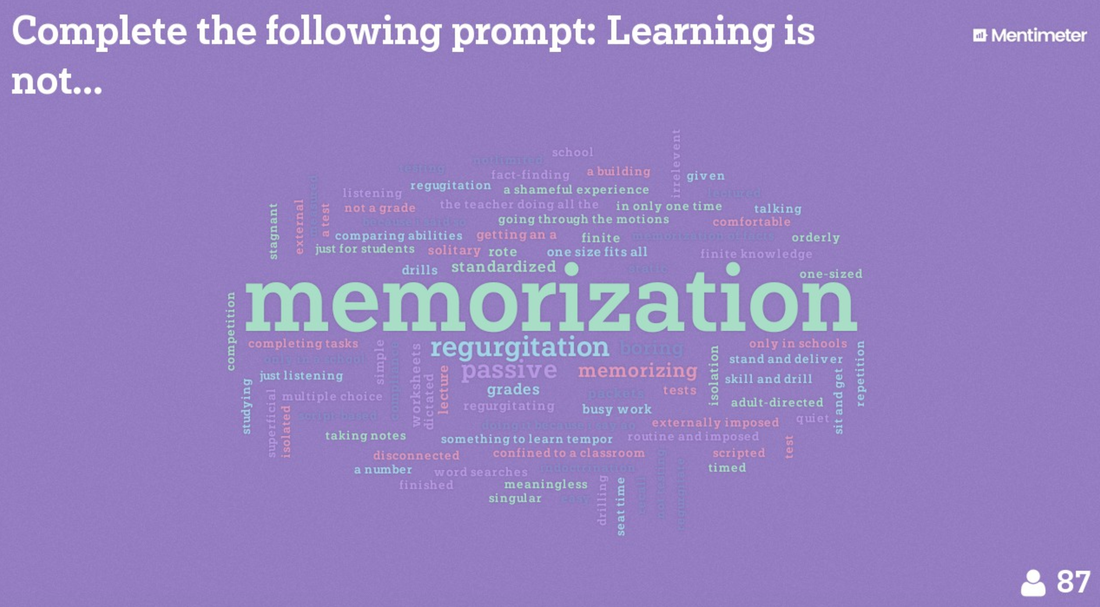
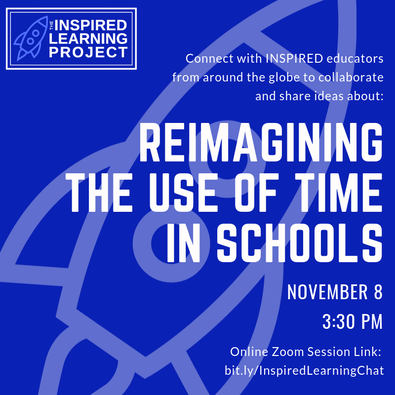
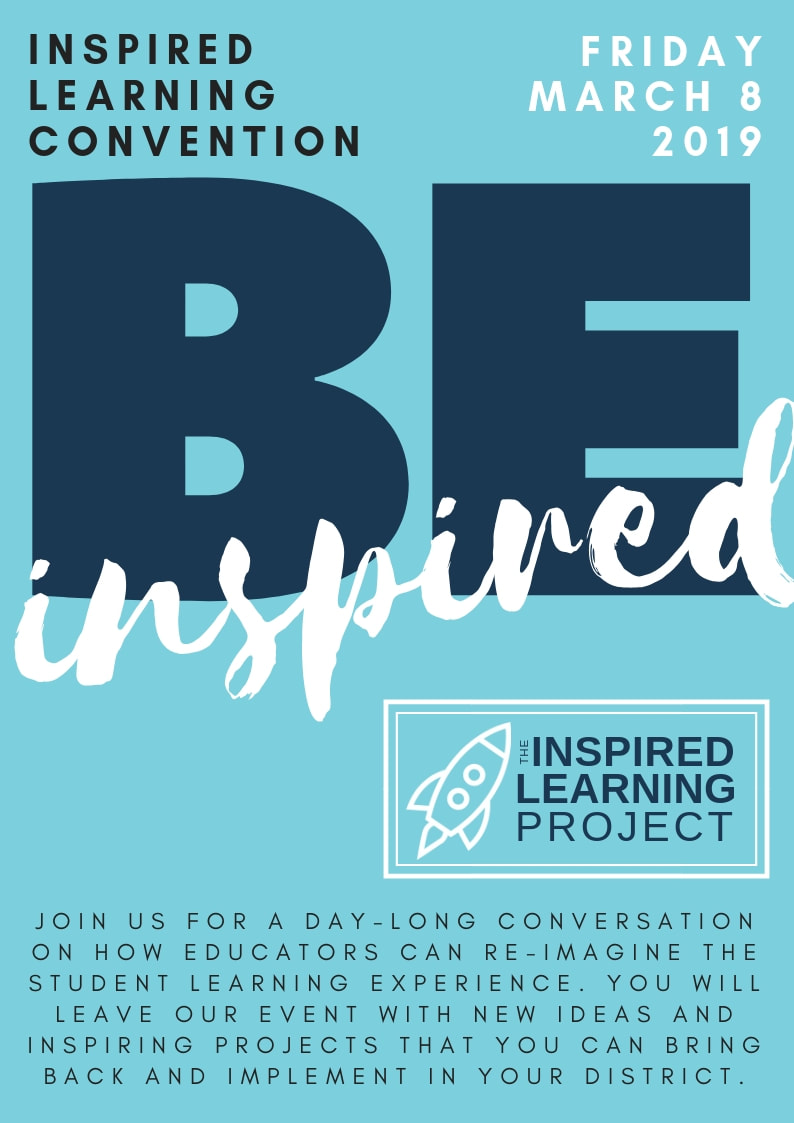
 RSS Feed
RSS Feed